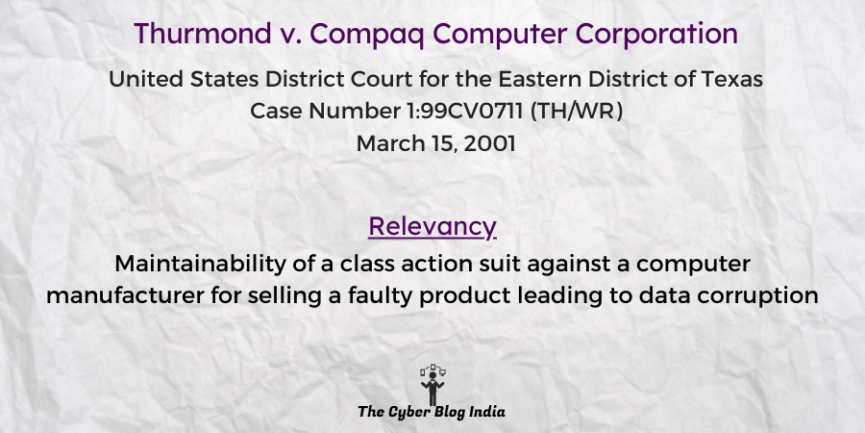Thurmond v. Compaq Computer Corporation

Thurmond v. Compaq Computer Corporation
171 F.Supp.2d 667
In the United States District Court for the Eastern District of Texas
Case Number 1:99CV0711 (TH/WR)
Before District Judge Heartfield
Decided on March 15, 2001
Relevancy of the Case: Maintainability of a class action suit against a computer manufacturer for selling a faulty product leading to data corruption
Statutes and Provisions Involved
- The Computer Fraud and Abuse Act, 18 U.S.C. § 1030
Relevant Facts of the Case
- The plaintiffs have filed a class-action suit against Compaq Computer Corporation. Compaq, the defendant, manufactured and sold computers containing FDC (floppy disk controllers).
- The plaintiffs allege that these FDCs are defective as they do not detect boundary errors. This defect corrupted or destroyed the stored data without the operator’s knowledge.
- The defendant launched a software application to remedy the defect. However, one of the plaintiffs found no cure even after installing it.
- The plaintiffs have filed this suit for violation of Section 1030, breach of contract, breach of warranty, and revocation of acceptance.
- To counter this, the defendant has filed a motion to dismiss for lack of subject-matter jurisdiction and failure to state a claim.
Prominent Arguments by the Counsels
- The plaintiffs’ counsel argued that the defendant knowingly transmitted the defective code and software program. This caused damage to all the purchasers of their product.
- The defendant’s counsel submitted that the plaintiffs could not show impairment to the integrity or availability of data and failed to show damage above the statutory limit of $5,000.
Opinion of the Bench
- The court cannot calculate damages as an aggregate of all the members of a class. The plaintiffs must first establish a personal injury.
- To maintain a class action suit, the proposed representative must fairly and adequately protect the class members.
- Dismissal is appropriate where the complaint files to state a claim upon which the relief may be granted.
Final Decision
- The court dismissed the plaintiffs’ claim as they could not prove sufficient damages under CFAA.
Ojasvi Gupta, an undergraduate student at the Faculty of Law, Banaras Hindu University, prepared this case summary during her internship with The Cyber Blog India in May/June 2022.
